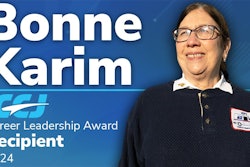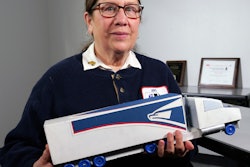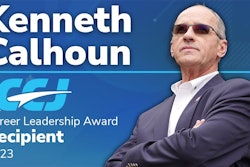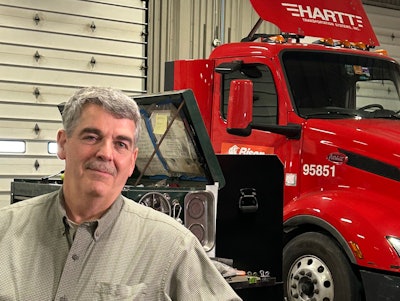
The 2025 CCJ Technology and Maintenance Career Leadership Award is sponsored by Bendix, Peterson Manufacturing, Travel Centers of America, and Petro Canada Lubricants.
The average person changes jobs five to seven times during their working life, according to the U.S. Bureau of Labor Statistics. But Todd Cotier, shop manager for Bison Transport USA, is anything but average. Based at Bison's Auburn, Maine, terminal, he's never left the company that hired him 43 years ago.
Cotier came to Bison only recently by way of its acquisition of Bangor, Maine-based Hartt Transportation in 2022. Up until the ink was signed on that deal, Hartt was the only employer Cotier had ever worked for professionally in transportation. Most of his work experience prior was owed to his father.
"My parents owned a small construction company. My grandfather had the business before they did, and they took that over when I was younger," he recalled.
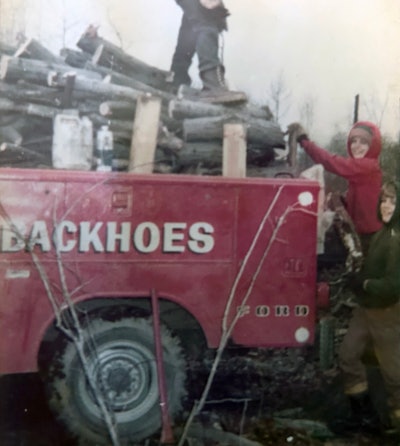 Todd Cotier logged a lot of work experience at his family's construction company in New Jersey as a young boy.
Todd Cotier logged a lot of work experience at his family's construction company in New Jersey as a young boy.
"After-school activities included 100% of the time was work. There was time for fun when the work is done. I just started working at my father's shop first, cleaning the shop, scraping the floors, cleaning the floors, waxing a dump truck ... that stuff you were doing when you were 12 or 13 years old, I guess. I learned a lot, but I'm sure I didn't like every minute of it when I was younger."
Learning a lot is a theme throughout Cotier's 40-plus-year career in fleet maintenance. His passion is trucks, and he fed that passion by learning everything he possibly could about how to keep them rolling.
"One year, I went to so many schools the founder of our company is like, 'Are you going to work at all this year? You're going from one school to another, one manufacturer school to the other,'" Cotier recalled. "I was certified in so many different engine things ... all kinds of stuff."
Cotier and his family moved to Maine after his sophomore year of high school. Cotier studied the automotive mechanic track at a vocational high school in his native state of New Jersey, and the move north put him on the fast track to graduation.
"I was 15 going on 16 when I got uprooted and started going to high school in Searsport, Maine," he recalled, "and I found out I only needed two English classes and two history classes to graduate as a junior in high school. I actually went to high school for two and a half years. I went half days. I did my junior and senior year in one year and graduated at 17 years old."
Finding a home at Hartt
Cotier planned to join the military post-graduation but since he was under the age of 18, he needed parental consent – and he couldn't get it.
"My mother would not sign the papers," he said. "This is 1982. The economy wasn't that great, and jobs weren't plentiful, but I landed a job with Hartt Transportation at 17 years old working the night shift making $4.65 an hour."
The move to Maine afforded Cotier two life milestones at an early age. "The best thing I got out of that was my wife and a diploma – in that order," he laughed. It didn't take long for Hartt Transportation, then a 35-truck outfit, to settle into the No. 3 spot on Cotier's list.
"My first day on the job, I haven't even met the owners of the company. It's a family business, and I haven't met the owners, but I'm working with my second-shift supervisor, and he says, 'You need to take your vehicle down and get tires put on it tomorrow,'" he remembered. Cotier knew his 1965 Ford F-250 needed tires, but a kid fresh out of high school on his first day at work isn't exactly rolling in discretionary funds.
"I was hoping I'd get traction once I got down to the nylon cords again because, right now, it's just on straight flat rubber," he said. "I told my supervisor, 'I'm on bald tires because I have no money. I cannot afford to buy tires. That's why they're bald.' He said, 'Don't worry about it. They'll do a payroll deduction deal for you.' That was day one. I knew I found a home my first day at work."
Cotier literally found his home at Hartt Transportaton.
"Hartt hauled log homes for the manufacturer, log home kits," he said. "We rolled the truck over, and I actually bought my house from Hartt Transportation. I bought the salvage from a rolled over truck. So, first set of tires and my house."
Now a young family man and home-owner, Cotier set out to make a name for himself as a professional, and it didn't take long for his coworkers to take notice.
"The fellow that ran second shift was a farmer, and his father was tougher than my father, which is hard to believe, but I knew how to work. I gained respect instantly because I wasn't slacking," he said. "You did all this stuff nobody else would do or wanted to do."
Cotier found a mentor in a fellow technician that he thought "was a very, very intelligent fellow" and arranged to shadow him on more advanced mechanical work on his own time.
"They'd allow him to use our shop for side work, so I would clean parts for him when he would tear a motor apart," he said. "I wouldn't even get paid. I just wanted to learn. I wanted to know how all that worked."
Thirst for knowledge
Cotier also embraced training available from equipment manufacturers and Hartt Transportation's vendors, even if it meant upending longstanding company practices.
"Every little seminar the local spring dealer would have or the local truck dealer would have – they used to have trainers that would come in and do a two-hour seminar – I went to every one of those," he recalled.
"The guy we bought our springs and our brake parts from, they would have somebody come in from the spring manufacturer and teach how to change the spring properly. And we did it 1,000% wrong," he laughed. "I did it the way I was trained at work, and we did everything wrong. We reused all the U-bolts. We rethreaded them. We heated them. We did everything you're not supposed to do. After that one seminar, every day I would change two or three springs, whether it's on a truck or a trailer – everything was spring ride – and I listened to my training. I went under there, I cut the U-bolts, threw them on the floor and told my shop manager that I needed U-bolts."
Cotier recalled the shop manager going to Hartt ownership over this new practice and rather than having to defend it as not wasteful, Hartt decided to let it play out.
'He said, 'Let's try that for a while.' Probably 15 years later, the owner comes to me and asks, ' Do you know how many millions of dollars you saved us by cutting those U-bolts off?' He remembered that from that long ago. I said, 'I guess I never really thought about it, but we don't have spring problems like we used to.'"
Giving back
Cotier threw his ongoing quest for knowledge into the Technology and Maintenance Council, eventually taking over the Corrosion Control Action Committee from Roy Gambrell.
"Roy says to me, 'You've been taking a lot of milk. It's time you start feeding the cow,'" Cotier laughed. "Roy asked me if I was interested in [chairing CCAC]. That's a big job, so I talked to Darry Stewart and asked what he thought. He says, 'Are you passionate about corrosion?' I said, 'I am,' which sounds crazy, but corrosion kicks our butt in the northeast. Everything we touch is affected by corrosion. And he said, 'You'll be fine.'"
His deep understanding of how things should work and aptitude for fixing them have led Cotier to be a frequent guest of truck and equipment manufacturers as they seek to refine reliability.
"We had a routing and clipping issue with one manufacturer, and I was invited to the plant six times one year to meet with engineering," he said. "We're a small fleet out of Bangor, Maine, and six different groups of engineers would come in to meet with me ... It was amazing because I feel I helped change the industry in some respects towards those issues we were having. Some of our trucks were so bad that I had the state police come and inspect brand new vehicles that we didn't even own yet, and they wrote them up as they would not pass a level one roadside inspection."
Cotier was appointed TMC general chairman in 2023 and at that point had been a member of TMC for 25 years. However, it wasn't until Bison's acquisition of Hartt Transportation a year earlier that he was able to check TMC Chairman off his professional bucket list since Hartt wasn’t an active ATA member.
When he's not fixing trucks or restoring old tractors, Cotier is an active Free Mason and Shriner. He finds particular joy in being a Shriner.
"We have 22 children's hospitals that could be free of charge if you don't have the ability to pay," he said. "One of the things I do is I drive a little tractor trailer truck in parades on the weekends and in the summertime. I enjoy that. The good feeling is there's 22 children's hospitals that are free, and we have two burn centers. It's remarkable that somebody you know has a child that has a problem, and you're able to help. It's a definitely a sense of achievement for being part of that."


